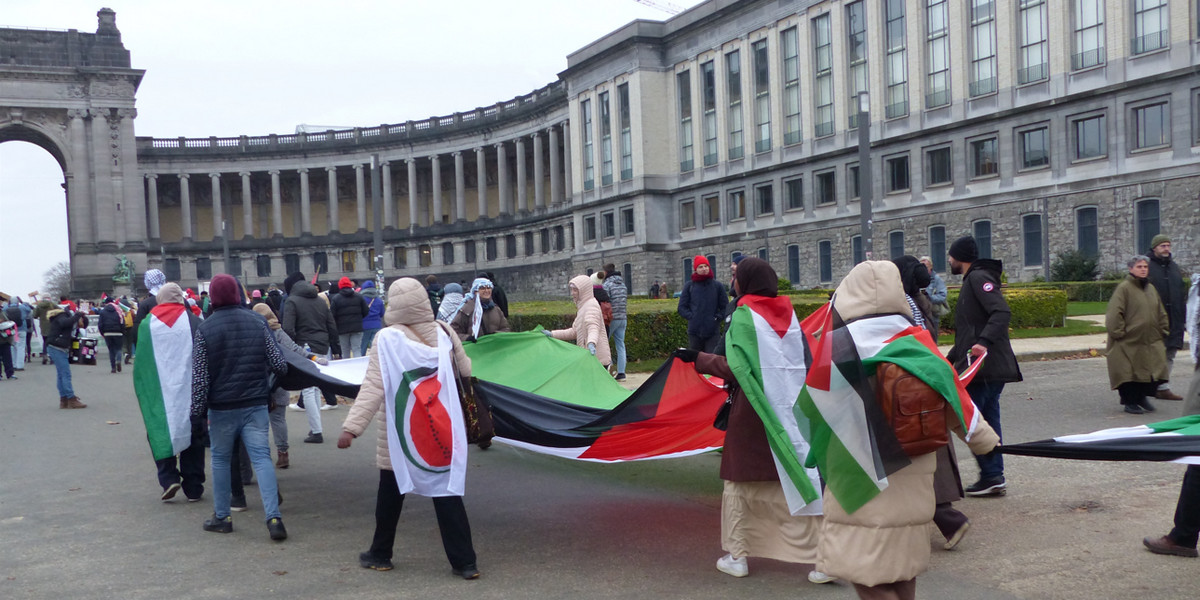A blog by Josianne Gauthier, CIDSE Secretary General
A few days before the 75th anniversary of the Universal Declaration of Human Rights, and exactly two months after a new chapter in the Israeli-Palestinian conflict began, the Secretary General of the United Nations, António Guterres invoked the article 99 contained in the Charter of the United Nations – a very rarely used measure – to draw the attention of the Security Council to what he considers a serious threat to world peace: the ongoing military intervention by Israeli forces in Gaza.
The Universal Declaration of Human Rights and the State of Israel share the same birth year, a remarking time for humanity and peace, allowing people to live safely and protected by International Law.
The people of Israel are in grave pain and their families are desperate to be rejoined with the hostages held by Hamas in Gaza. Hundreds of families continue to grieve the lost lives of October 7th and live in fear and insecurity. Meanwhile, the inhabitants of Gaza are facing a rising death toll, forced displacements, daily bombing, including no access to safety shelters, lack of water, medical or humanitarian aid, with growing malnutrition and starvation.
The earth is crying out from deep within her womb. The land is being ravaged and humans are being swallowed in a spiral of anger and violence. What hope is there for the future if we continue down this path? We need to collectively reclaim our dignity and humanity, and move past the violence, the vengeance, the hatred, the horror, and return to ideals and values of mutual respect, justice, peace, reconciliation, and healing.
The UN Secretary General’s recent call for a ceasefire is a bold move. Some have criticised it as a “new moral low”. This begs the question: What morality are we referring to if we are all human, deserving of the same protection and right to live in peace? How can it be immoral to ask that life be safeguarded? Can justice be pursued without more death? Can we look for something greater, beyond our limited imaginations for a way to peace?
When Human Rights and Humanitarian Law are no longer the collective references for us all, our relationships with each other are truly, deeply wounded if not broken. How can we see each other again and begin with a first step towards one another? We can do that simply by acknowledging that we are capable of so much more, and that we have responsibilities towards those who do not hold weapons in their hands. They must be the first ones we think of. They deserve to live.
In the words of Pope Francis at COP28 on December 3rd, “A world that lacks prayer will speak many words but bereft of compassion and tears, will only live off a materialism made of money and weapons.”
Moreover: “Before our very eyes, we can see how wars and conflicts are harming the environment and dividing nations, hindering a common commitment to addressing shared problems like the protection of the planet. A home is only livable when a climate of peace reigns within. So it is for our earth, whose very soil seems to add its voice to those of the children and the poor who cry out to heaven pleading for peace!”.
As we celebrate the 75th anniversary of the Universal Declaration of Human Rights, we all should join our voices claiming for an immediate ceasefire, the return of the hostages and opening of borders to humanitarian aid as a first essential step to reclaiming some dignity for us all. We can’t be silent witnesses to this moral unfolding and shake off our responsibilities towards one another as a human family.
Cover image: Climate march, Brussels, 3 December 2023. Credit: CIDSE

